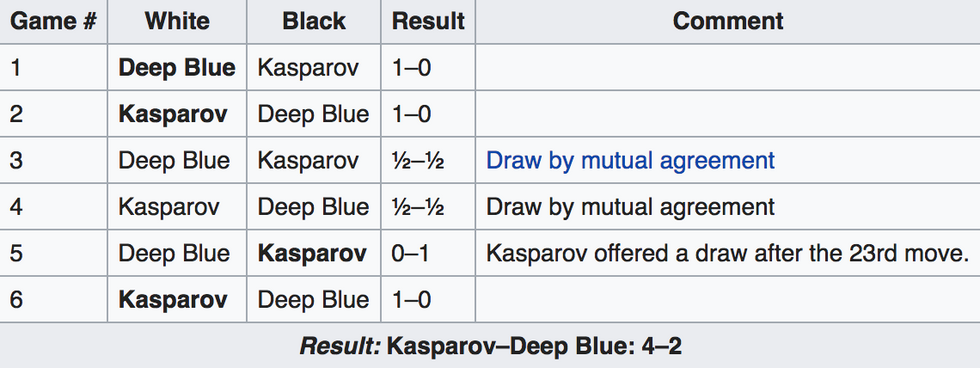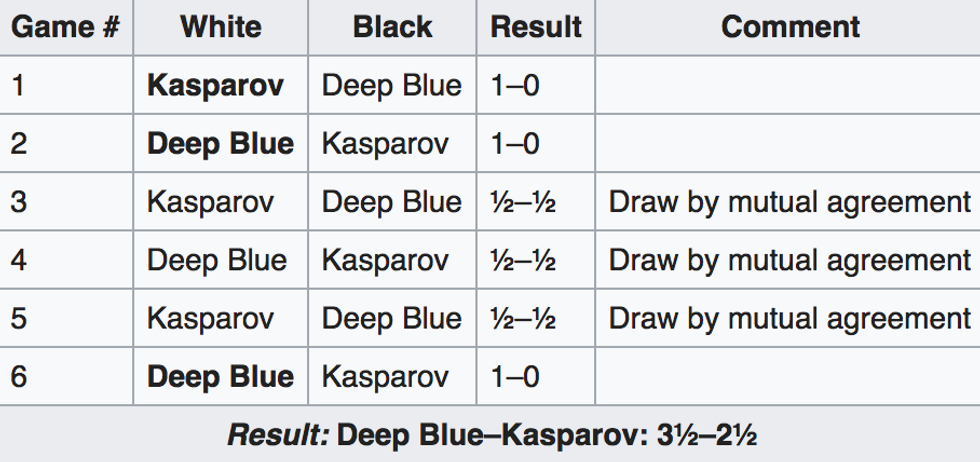
Chess
Photo by Frankie Cordoba-Unsplash
 1996 match summaryWikipedia
1996 match summaryWikipedia
Unsatisfied in defeat, IBM’s engineers retooled their machine and challenged Kasparov again in 1997. This time, Deep Blue won.
 1997 match summaryWikipedia
1997 match summaryWikipedia
The symbolic significance of this victory wasn’t lost on any of its participants. It was the modern version of John Henry vs the Steam Engine and marked the end of an era for the chess world. There are some who believe (erroneously) that this means the machine was capable of thought, but they’ve watched the Terminator too many times. What was really created, was a device through which a composite of chess knowledge from various grandmasters and theorists was inputed. The output of Deep Blue was various responses based off it’s compendium of chess data. Essentially, the game was never fair. Kasparov was playing against hundreds of grandmasters at once. IBM simply created a tool with which channel these grandmasters’ chess skill through a single channel. More on the importance of this distinction later.
In the two decades since Deep Blue’s victory, developers have continued to build upon IBM’s legacy. Programs like X3D Fritz and DeepFritz played against Kasparov and his successor Vladimir Kramnik respectively throughout the early aughts, but as computer technology improved and got smaller, playing against human competitors became moot. To give you an example: in 2009, a smartphone won a major chess tournament in Buenos Aires. At this point, programmers stopped seeking human opponents and started setting up matches between chess engines. The programs were given more intimidating names. Names like, Komodo, Houdini, and Shredder. The unanimous leader of this new group of chess engines however, emerged in 2014.
Stockfish is a program that routinely crushes the world’s best grandmasters, even when given severe handicaps. All of these new engines compete in tournament known as Top Chess Engine Championship, considered by many to be the unofficial computer chess world championship. Of the 16 tournaments the TCEC has hosted thus far, Stockfish has won or been the runner-up 11 times, cementing its status as the world’s greatest chess engine. Recently, Google’s DeepMind AlphaZero defeated Stockfish, but the circumstances in which the match was played were dubious at best. For all intents and purposes, Stockfish is still the computer champion of the world, that is until Google’s team agrees to a fair competition. Still, the results were very pretty:
With the future of chess firmly in the hands of developers, the question that remains is: what are we building towards? If the game is meant to be played between two humans as a test of intellectual skill, it seems odd that we would put so much stock into competition between machines, machines who can neither feel the joy of victory nor the misery of defeat. Sure, the developers are invested in winning, but the immediacy of active participation is missing. They program the machine, but they don’t move the pieces or struggle to develop an opening line. In response to this, it could be posited that there’s an entirely different competition going on, a slow plodding race to solve the game of chess.
The idea of solving chess is based on the principle that white has an advantage by going first and that there’s a way to play this advantage so perfectly that white always wins. If we take this to be the end goal for all professional chess programmers, beating Stockfish is no longer considered victory but rather a taking of the lead by AlphaZero. The game is still very much alive, Google just managed to score a point.
The thing is, none of this really matters much to human chess players. These chess engines aren’t really even playing chess. Their using algorithms and analyzing near-infinite swathes of data to see how to move pieces on grid, completely divorced from reality. They don’t feel. They aren’t even truly competing, so there’s no reason to feel like chess is being taken over. Usain Bolt doesn’t lost sleep over the fact that he can’t outrun a Toyota Camry. Even if chess were solved, the series of moves that lead to victory would be so complex with so many different variables, that it wouldn’t really effect the way humans play in any meaningful capacity. Openings might become a little more standardized in tournament play, but for the most part these chess computers are there to help players practice. Even grandmasters use them to improve their game. There’s still a huge difference between taking foul shots in your driveway and taking them at the Staples Center. To answer the question posed by the title of this article: chess isn’t going anywhere.
Matt Clibanoff is a writer and editor based in New York City who covers music, politics, sports and pop culture. His editorial work can be found on Popdust, The Liberty Project, and All Things Go. His fiction has been published in Forth Magazine. Website: https://matthewdclibanoff.journoportfolio.com/ Twitter: @mattclibanoff
POP⚡DUST | Read More…
THE OPTION | The Stafford Effect
THE OPTION | Catalan Independence and What It Means for Barcelona Soccer













